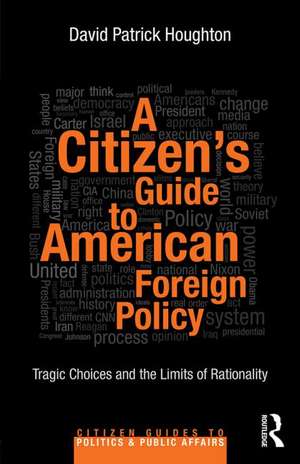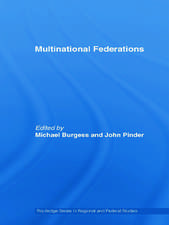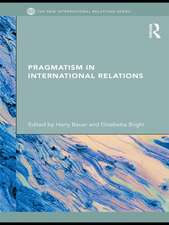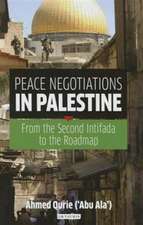A Citizen's Guide to American Foreign Policy: Tragic Choices and the Limits of Rationality: Citizen Guides to Politics and Public Affairs
Autor David Patrick Houghtonen Limba Engleză Paperback – 12 noi 2013
Written with the interested layperson in mind, as well as students of international affairs, this Citizen’s Guide to American Foreign Policy asks questions like, "Why do presidents so often do things which seem to be directly against the national interests of the United States – not just in retrospect, but even at the time?" "Why do there seem to be so many fiascoes in US foreign policy?" "Why does Congress sometimes tie the hands of the president in foreign affairs?" "Why do presidents seem to respond more to opinion polls or to what’s on CNN and Fox News than they do to the core interests of the United States?" Houghton’s overview helps us see past the partisan in-fighting that too often obscures the central issues in foreign affairs. This is vital, required reading for all readers who wish to better understand America’s involvement in the world.
| Toate formatele și edițiile | Preț | Express |
|---|---|---|
| Paperback (1) | 230.13 lei 6-8 săpt. | |
| Taylor & Francis – 12 noi 2013 | 230.13 lei 6-8 săpt. | |
| Hardback (1) | 864.09 lei 3-5 săpt. | |
| Taylor & Francis – 20 noi 2013 | 864.09 lei 3-5 săpt. |
Preț: 230.13 lei
Preț vechi: 278.79 lei
-17% Nou
Puncte Express: 345
Preț estimativ în valută:
44.04€ • 46.09$ • 36.65£
44.04€ • 46.09$ • 36.65£
Carte tipărită la comandă
Livrare economică 01-15 aprilie
Preluare comenzi: 021 569.72.76
Specificații
ISBN-13: 9780415844086
ISBN-10: 0415844088
Pagini: 166
Ilustrații: 1 table
Dimensiuni: 138 x 216 x 15 mm
Greutate: 0.22 kg
Ediția:New.
Editura: Taylor & Francis
Colecția Routledge
Seria Citizen Guides to Politics and Public Affairs
Locul publicării:Oxford, United Kingdom
ISBN-10: 0415844088
Pagini: 166
Ilustrații: 1 table
Dimensiuni: 138 x 216 x 15 mm
Greutate: 0.22 kg
Ediția:New.
Editura: Taylor & Francis
Colecția Routledge
Seria Citizen Guides to Politics and Public Affairs
Locul publicării:Oxford, United Kingdom
Public țintă
General and UndergraduateCuprins
Preface. 1. The Fiasco Factory: A Frank Drebin School of American Foreign Policy? 2. Don’t Know Much About History: What’s the Difference Between Iran and Iraq, Again? 3. Republicans or Democrats, and Leadership In General: Does It Make a Difference? 4. The Trouble With Congress 5. Special Interests: How Special Are They? 6. Making Foreign Policy By Image, Soundbite and Opinion Poll? 7. See No Evil, Hear No Evil 8. Conclusions.
Notă biografică
David Patrick Houghton is Associate Professor of Political Science at the University of Central Florida. He is the author of US Foreign Policy and the Iran Hostage Crisis (Cambridge University Press), Political Psychology: Situations, Individuals, and Cases (Routledge), and The Decision Point: Six Case Studies in US Foreign Policy Decision-Making (Oxford), as well as co-author of Controversies in American Politics and Society (Blackwell Publishing Inc).
Recenzii
"Why do smart people make poor decisions? In this fascinating and well written Citizen's Guide, David Houghton explains why things often turn out so poorly for American presidents and their foreign policy advisers. Everyone interested in understanding how our government works (or doesn't) should read this book."
—James Goldgeier, Dean of the School of International Service, American University, and author of America Between the Wars: 11/9 to 9/11
"Aside from students in their classrooms, political scientists must engage the public at large so as to do their part in enabling a critical citizenry. Houghton demonstrates tremendous talent in engaging, educating and entertaining his audience about American foreign policy. He is provocative, but constructive, and his book is an important public service."
—Akan Malici, Furman University
"Engaging in style, creative in approach, insightful in its analysis, and written to be accessible to any student or citizen interested in American foreign policy."
—Bruce W. Jentleson, Duke University
"Why do smart people make poor decisions? In this fascinating and well written Citizen's Guide, David Houghton explains why things often turn out so poorly for American presidents and their foreign policy advisers. Everyone interested in understanding how our government works (or doesn't) should read this book."
—James Goldgeier, Dean of the School of International Service, American University, and author of America Between the Wars: 11/9 to 9/11
"Aside from students in their classrooms, political scientists must engage the public at large so as to do their part in enabling a critical citizenry. Houghton demonstrates tremendous talent in engaging, educating and entertaining his audience about American foreign policy. He is provocative, but constructive, and his book is an important public service."
—Akan Malici, Furman University
"Engaging in style, creative in approach, insightful in its analysis, and written to be accessible to any student or citizen interested in American foreign policy."
—Bruce W. Jentleson, Duke University
"Well informed, thoughtful, and engaging, this work will serve introductory students well but has sufficient depth and originality of analysis to also be of interest to advanced students and specialists...Summing Up: Highly recommended. All readership levels."--M. F. Farrell, Ripon College, CHOICE
—James Goldgeier, Dean of the School of International Service, American University, and author of America Between the Wars: 11/9 to 9/11
"Aside from students in their classrooms, political scientists must engage the public at large so as to do their part in enabling a critical citizenry. Houghton demonstrates tremendous talent in engaging, educating and entertaining his audience about American foreign policy. He is provocative, but constructive, and his book is an important public service."
—Akan Malici, Furman University
"Engaging in style, creative in approach, insightful in its analysis, and written to be accessible to any student or citizen interested in American foreign policy."
—Bruce W. Jentleson, Duke University
"Why do smart people make poor decisions? In this fascinating and well written Citizen's Guide, David Houghton explains why things often turn out so poorly for American presidents and their foreign policy advisers. Everyone interested in understanding how our government works (or doesn't) should read this book."
—James Goldgeier, Dean of the School of International Service, American University, and author of America Between the Wars: 11/9 to 9/11
"Aside from students in their classrooms, political scientists must engage the public at large so as to do their part in enabling a critical citizenry. Houghton demonstrates tremendous talent in engaging, educating and entertaining his audience about American foreign policy. He is provocative, but constructive, and his book is an important public service."
—Akan Malici, Furman University
"Engaging in style, creative in approach, insightful in its analysis, and written to be accessible to any student or citizen interested in American foreign policy."
—Bruce W. Jentleson, Duke University
"Well informed, thoughtful, and engaging, this work will serve introductory students well but has sufficient depth and originality of analysis to also be of interest to advanced students and specialists...Summing Up: Highly recommended. All readership levels."--M. F. Farrell, Ripon College, CHOICE
Descriere
American foreign policy often looks like a trail of man-made debris and disaster. Of course, the explanations for many poorly-made decisions are rather complex. In this brief and cogent analysis, Houghton shows us that understanding American foreign policy often comes down to the psychology of decision-making, the limited options available, and the structure of government. This is vital, required reading for all readers who wish to better understand America’s involvement in the world.





















